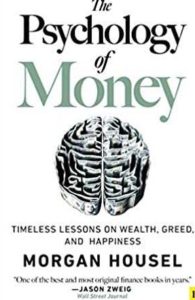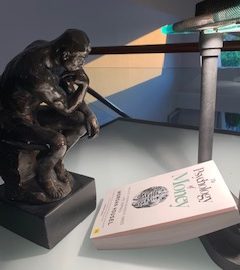
The Psychology of Money:
Timeless lessons on wealth, greed, and happiness
by Morgan Housel 2020
A Review of this Outstanding Book
Part 1 by Late Bloomer Wealth and 403(b) reform advocate:
Steve Schullo
From the first sentence to the last, this book provides the latest and most up-to-date evidence for financial literacy’s wholesome power to enrich your entire life. The author tells stories to discover financial literacy and living a good life go hand and hand. Most financial books discuss the dominated and respected quantitative side, the sophisticated science, complicated formulas, and mind-numbing statistics. Reading the traditional personal finance genres makes people erroneously think investors need to be intelligent and aggressive to invest successfully.
The Psychology of Money is courageously different. It is about life first and finances second. Don’t we want to better understand our behavior, our sense of ourselves and what makes us tick so we can achieve that vibrant and contented life? I know I do.
The author skillfully separates the easy part of discovering the investing process versus the hard part. This may shock newbies, but understanding the quantitative aspect of finances, such as constructing a diversified portfolio of low-cost index funds, is the easy part. Look, it is not the little guy or gal versus the massively intimating stock market with the macho goal of beating the average returns. Instead, this book is about understanding our behavior and the decisions we make to fully accept the market average returns over time. Now that’s the hard part! But this author makes understanding our behavior achievable and interesting. He accepts whatever skills, experience, or knowledge readers bring to the table.
The author brings up an age-old adage that we have been taught by our elders for generations—don’t take things so personally! With life’s many challenges and sometimes negative surprises, isn’t it about how we react that counts? Instead, if we respond with wisdom gained from our experiences over the long haul, the challenge itself will eventually be insignificant.
The author explains that our reactive behavior, whether the sudden death of a loved one, a broken water pipe damaging our house, or a stock market crash, how we respond to each of these vastly different crises is no different. As a reviewer of this outstanding book, I took the liberty of interpreting the primary theme with my examples. With the death of a loved one, we can blame the doctors, the hospital, and isolate from friends and family, and sob over beers for the rest of your life as a lonely and bitter widow or widower, or you can blame the stock market, your broker, or valueless Wall Street for your portfolio loses. For example, it is well known that millions of investors reacted negatively for over a decade. They sat out with their two to three trillion of the longest bull market in history because they lost money in the 2008 financial crisis. So, no matter what the experience, isn’t it always how we react? This book would help those unfortunate investors pull themselves and their portfolio together to get back in the market.
To bring mindfulness to our reactions, the author talked about investors’ emotions, attitude, and temperament. To be successful in this counterintuitive financial system is to be aware and insightful of this powerful psychological human potential—your expectation of future returns. The Goldilocks Principle doesn’t have too high return expectations or too low, but somewhere in between. But what is a reasonable expected return?
The United States Stock Market Returns 6.8% after Inflation
According to the author, our United States capitalistic system produces about 6.8% return minus inflation since the 1870s (3.1% average inflation generates a total return of 9.9%). It is the law of averages, and it is powerful if we know how to tap into it and to be 100% satisfied with average returns (It has been researched many times that too many investors fail to get average returns). Morgan explains how to harness this massive industry and what strategy will get you the average return. The goal is to earn the average return over many years. Why? Two reasons:
- 6.8% return over inflation is a great return!
- Because our emotions will be spared the negative reactions from the massive swings (volatility) of the stock market which will set you up to panic and “get out.”
This book will help you find that “just right” balance of your investments and your mind so you can sleep soundly with confidence and reach your financial goals over long periods of time. There is no get rich quick scheme. If a financial adviser or your best friend says that they can beat the averages, walk away, and never listen to that nonsense.
Housel encourages all investors by debunking one debilitating myth from the start. All you need to be a successful investor is patience, think long term, and one tiny piece of mathematics, the power of compound interest over decades. You do not need an MBA or a high IQ! In fact, for the newbie financial reader with no financial background or smarts, take heart, you have an advantage. He wrote: “Ordinary folks with no formal financial education can be wealthy if they have a handful of behavioral skills that have nothing to do with formal measures of intelligence.”
Part 2 continues.
